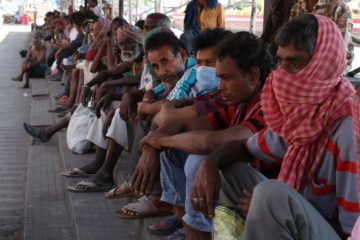One of the biggest achievements of 2018 is the sustained aftershocks of the #MeToo movement. It cannot be denied that the #MeToo movement brought the reality of sexual harassment and assault into the public consciousness, consequently helping victims of sexual abuse feel less alone and to come forward with their stories when ready to do so. However, the movement and the reporting of it was not without flaws. Sparked by the exposure of American film producer Harvey Weinstein as a sexual predator in 2017, the movement helped women find their voice in the fight against sexual harassment and assault. Many women pressed charges successfully against several high-profile men in the entertainment and media industry, such as the indictment and subsequent imprisonment of American comedian Bill Cosby. The movement’s reach spread beyond Hollywood into politics with Christine Blasely Ford’s testimony at Supreme Court Justice Brett Kavanaugh’s hearing in September 2018, where she testified that Kavanaugh had sexually assaulted her in high school.
Beyond America, #MeToo spread globally as women and men across the rest of the world told their stories. Actresses and actors in India seized their #MeToo moment by breaking the silence on sexual abuse in Bollywood. Iranians joined the movement with an alternative hashtag, #MosqueMeToo, to raise awareness of sexual abuse within Islamic holy sites and the annual Hajj pilgrimage. More Iranians came forward to share their stories of being abused, including an attempt to raise awareness to allegations of indecent sexual behaviour on part of an educator at an all-boys high school in Tehran. Unlike previous attempts to dismiss such allegations, Iran’s Supreme Leader Ayatollah Ali Khamenei has demanded that the perpetrator be punished.
While significant, hindsight reveals several shortcomings of the #MeToo movement. What initially drew widespread attention to the movement was the status of the women involved. It is frustrating that famous women were deemed more credible and more readily heard than other women who have had the courage to raise their voices. #MeToo was also deemed a Western movement by mainstream media as it continues to report on #MeToo related events in the West, while consistently underreporting those of India, Iran and many other countries, or viewing them from a western perspective. The message this sends is that the voices of victims from more privileged backgrounds, whether they are from the ‘Global North’ or work within the entertainment business are more credible and authoritative than of those most marginalised within their societies.

Despite legal action being attempted, most men accused by the #MeToo movement are still being sent into exile rather than face the legal consequences of their actions. The reason for this is simple: there is an inability and lack of determination by national legislatures and the relevant institutions that should enforce accountability in cases of sexual abuse to tackle the issue. This was demonstrated during Supreme Court Justice Brett Kavanaugh’s hearing, as even after Christine Ford’s testimony, Kavanaugh was eventually sworn in, while Ford was forced into hiding by critics and others who sent death threats as a response to her decision to speak her truth. Despite an imperative step towards believing victims of sexual abuse, the #MeToo movement may prove to be a fleeting moment – a moment that generated big headlines but failed to forge a clear path towards achieving its goal of restructuring the same structures that promoted such abuses of power in the first place. Such restructuring necessitates a rewriting of policy, rather than piecemeal measures to improve women’s rights.
Nevertheless, the last year also proved to be watershed in the number of women elected into politics. In the US midterms a record-number of women won seats in Congress. Many of these were women of colour including the first Native American, Deb Haaland and Sharice Davids, and Muslim women, Ilhan Omar and Rashida Tlaib. The new socialist-led government of Spain sworn in last June have the highest number of female ministers in the country’s history. These women hold positions overseeing the state’s finances, defence, and education sectors. The impact of these political changes has been a move towards a more progressive migration policy. The country’s migrant arrivals doubled in 2018 even as neighbouring countries like Italy began to close its borders to migrants from the Mediterranean.
Beyond Spain, Europe has seen breakthroughs in gender equality, such as when women in Ireland turned out en masse last May to vote in a referendum that successfully repealed an abortion clause in the Irish constitution. Last October, many in the United Kingdom pushed for the reformation of the country’s Gender Recognition Act to seek an end to the degrading and inhumane process transsexuals must undergo for their gender to be legally recognised. Even the conservative government of Saudi Arabia have yielded to calls for change and lifted its long-standing ban on women driving.
These political advancements towards a more equal society are noteworthy. However, it is not productive to use them as a way of erasing the ways in which it is still the norm to see the abuses of power made by powerful white, heterosexual men as inherent to daily life. This was shown in 2018, with the rise of populist governments across Europe that incentivise misogynist, racist, and xenophobic politics. This form of politics has also been a hallmark of US President Donald Trump’s presidency. This rhetoric include direct attacks on women, such as the 19 women who had accused him of sexual abuse, limiting women’s access to abortion and birth control by reshaping Title X, and reinstating the Global Gag Rule which cuts US financial aid to critical health services for women and their families. The Trump administration has also sought to block multiple undocumented female immigrants’ right to abortion. 2018 The last year also saw the election of far-right politician Jair Bolsonaro as President of Brazil, a man that has been referred to as the “Trump of Latin America” for his previous homophobic and sexist comments. Such events suggest that the label “Year of the Woman” is only held up to specific moments that, while significant, were merely small steps towards a more equal society, rather than broader changes to protect the rights of women and minorities.
Thus, it is worth reconsidering the problematic label of 2018 as the “Year of the Woman”. The fleeting moments of feminist success that occured in the last year did not pan out within a vacuum, but were rather, the culmination of decades of achievements and efforts made by feminist activists. It is unwise to generalise the experiences of women across the world – women of colour, trans women, white women and other groups experience patriarchy differently and none of these groups achieved a long-term improvement in their welfare in 2018. The reason for this is simple: the essential reformation of the political and social structures that continue to allow abuses of power towards the most marginalised within society has not been achieved.
This reform cannot be expected to occur within a year, or even the next few years. Claiming 2018 as the “Year of the Woman” is a fundamentally self-congratulatory act of an already privileged and mainstreamed feminist movement that has failed to sufficiently acknowledge and commend the strides made by those whose struggles are most underrepresented and consequently erased of recognition. This failure will also put efforts to normalise the fight for gender equality on the backburner. The last year saw women coming together to fight important causes. But women have always been fighting these same fights and will have to continue doing so for the conceivable future.


